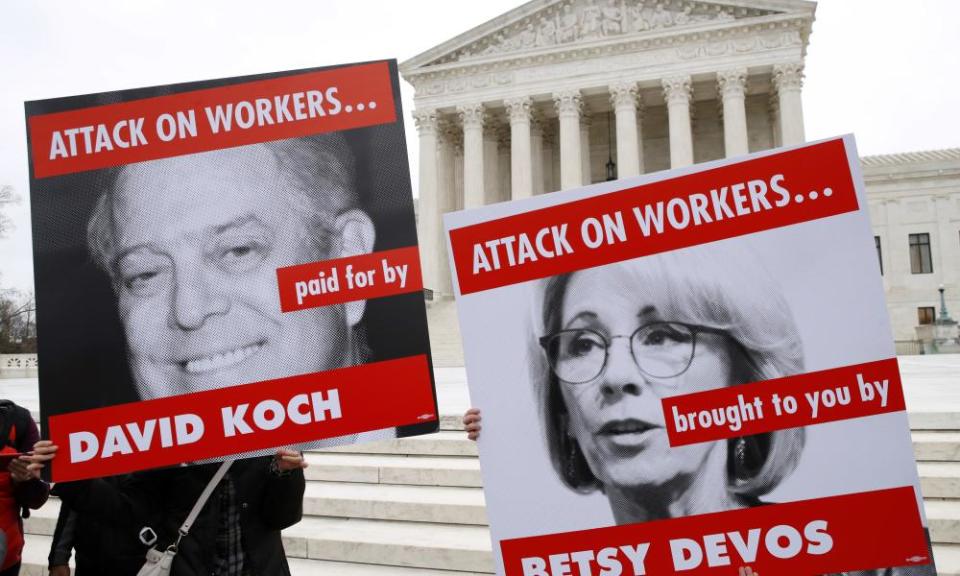If US unions tumble, the progressive movement could go with them
Working people will end up with fewer resources and less collective power if the US supreme court undermines the power of unions with its decision on Janus

This week the US supreme court may have given the Koch Brothers yet another tool to help them achieve something they have been dreaming of for decades: weakening the power of public-sector unions.
Oral arguments were held on Monday 26 February on Janus v AFSCME, a case that some have called the most important labor case of the century. The aim of the plaintiff’s case is to eliminate “fair share fees”, dividing public sector workers and limiting their power in numbers. If the supreme court finds in favor of the plaintiff, as they are widely expected to, public sector unions will no longer be able to collect fees automatically from the employees they represent, and these unions’ ability to operate will be dramatically undermined.
This lawsuit is part of a coordinated effort from far-right groups supported by funders like the Koch brothers to “defund and defang” US unions. A 10-page fundraising letter from the Koch-backed State Policy Network, obtained by the Center for Media and Democracy, says that by undermining unions, they can ensure “the permanent collapse of progressive politics”.
The billionaires behind this coordinated effort want to weaken unions and drive down wages and benefits for working people in order to line their own pockets with more profits – but that’s not their only goal. They also want to weaken the movements that working people support. When working people hold and exercise collective power, history shows that they use it to advocate for issues like climate action, civil rights, LGBTQ equality, and reproductive justice. By attacking unions, far-right conservatives hope to bring down the entire progressive movement.
By attacking unions, far-right conservatives hope to bring down the entire progressive movement
The same extremists who deny the reality of climate change, pollute without accountability, and seek to sell off our public lands to the highest bidder also understand that unions are the most effective way for everyday working people to build power. Unions are a political and economic pillar of the progressive community, providing a venue for millions of working people to make a difference on the issues they care about.
If the US supreme court undermines the power of unions with its decision on Janus, working people will end up with fewer resources and less collective power. Such a ruling could further tilt the balance of political power in favor of the polluters who prioritize their profits over clean air, clean water and a livable climate.
This attack on the ability of public sector unions to operate comes at a time when the environmental, climate and labor movements are working in closer solidarity than ever before. Over the past few years, unions like Service Employees International Union and United Steelworkers have closely allied with environmental groups on the Paris climate accord and the Clean Power Plan, and have fought for clean air and clean water in cities from Flint to Los Angeles.
Union members turned out in record numbers for the People’s Climate March. Our opponents – the polluters and their supporters in Congress – have noticed, and they are working to undermine the power of unions at least in part to undercut the environmental movement.
As representatives of two of the most prominent environmental organizations in the United States, we are in solidarity with working people to push back against these attacks. We know from experience that a strong union movement is essential to building a healthy environment for all.
Mae Boeve is the co-founder and executive director of 350.org. Michael Brune is executive director of the Sierra Club
